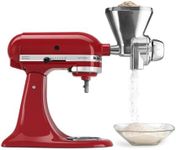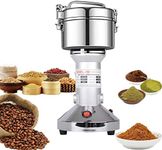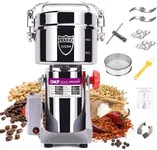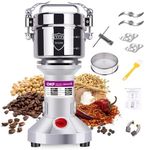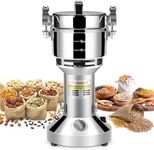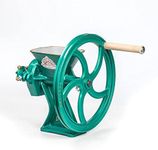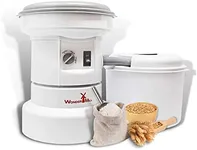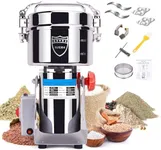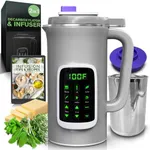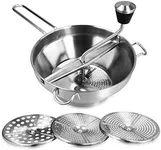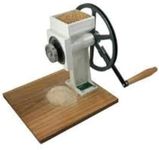Buying Guide for the Best Home Flour Mills
Choosing the right home flour mill can significantly enhance your baking and cooking experience by providing fresh, high-quality flour. When selecting a flour mill, it's important to consider several key specifications to ensure you get the best fit for your needs. Understanding these specs will help you make an informed decision and find a mill that suits your lifestyle and culinary preferences.Type of MillThere are two main types of home flour mills: manual and electric. Manual mills require physical effort to grind the grains, making them a good choice if you want a more hands-on experience or if you need a mill that can operate without electricity. Electric mills, on the other hand, are more convenient and efficient, as they can grind larger quantities of grain quickly with minimal effort. Choose a manual mill if you enjoy the process and don't mind the workout, or an electric mill if you prefer speed and ease of use.
Grinding MechanismThe grinding mechanism is the part of the mill that actually grinds the grain. Common mechanisms include burrs and impact mills. Burr mills use two grinding plates to crush the grain, which can be adjusted to produce different textures of flour. Impact mills use high-speed blades to pulverize the grain into fine flour. Burr mills are generally quieter and can produce a wider range of textures, making them ideal for bakers who need versatility. Impact mills are faster and can produce very fine flour, which is great for those who primarily bake bread or pastries.
Grain CompatibilityNot all flour mills can handle every type of grain. Some mills are designed to grind only certain grains, such as wheat, while others can handle a variety of grains, including corn, rice, and even beans. It's important to consider what types of grains you plan to grind and ensure the mill you choose is compatible with them. If you plan to experiment with different grains, look for a versatile mill that can handle a wide range of ingredients.
CapacityCapacity refers to the amount of grain the mill can process at one time. This can range from small mills that handle a few cups of grain to larger models that can process several pounds. If you bake frequently or in large quantities, a mill with a higher capacity will save you time and effort. For occasional use or smaller batches, a mill with a lower capacity may be sufficient.
Ease of CleaningKeeping your flour mill clean is essential for maintaining its performance and ensuring the quality of your flour. Some mills are easier to disassemble and clean than others. Look for a mill with removable parts and simple cleaning instructions. If you plan to use your mill frequently, ease of cleaning will be an important factor to consider to ensure it remains in good working condition.
Noise LevelElectric flour mills can be quite noisy, which may be a concern if you have a quiet household or sensitive ears. Manual mills are generally quieter but require more effort to use. If noise is a significant factor for you, look for mills that are specifically designed to operate quietly or consider a manual mill if you don't mind the extra work.
Durability and Build QualityA well-built flour mill will last longer and perform better over time. Look for mills made from high-quality materials such as stainless steel or heavy-duty plastic. Check for reviews and ratings to get an idea of the mill's durability and reliability. Investing in a durable mill will save you money in the long run and ensure you have a reliable tool for years to come.
